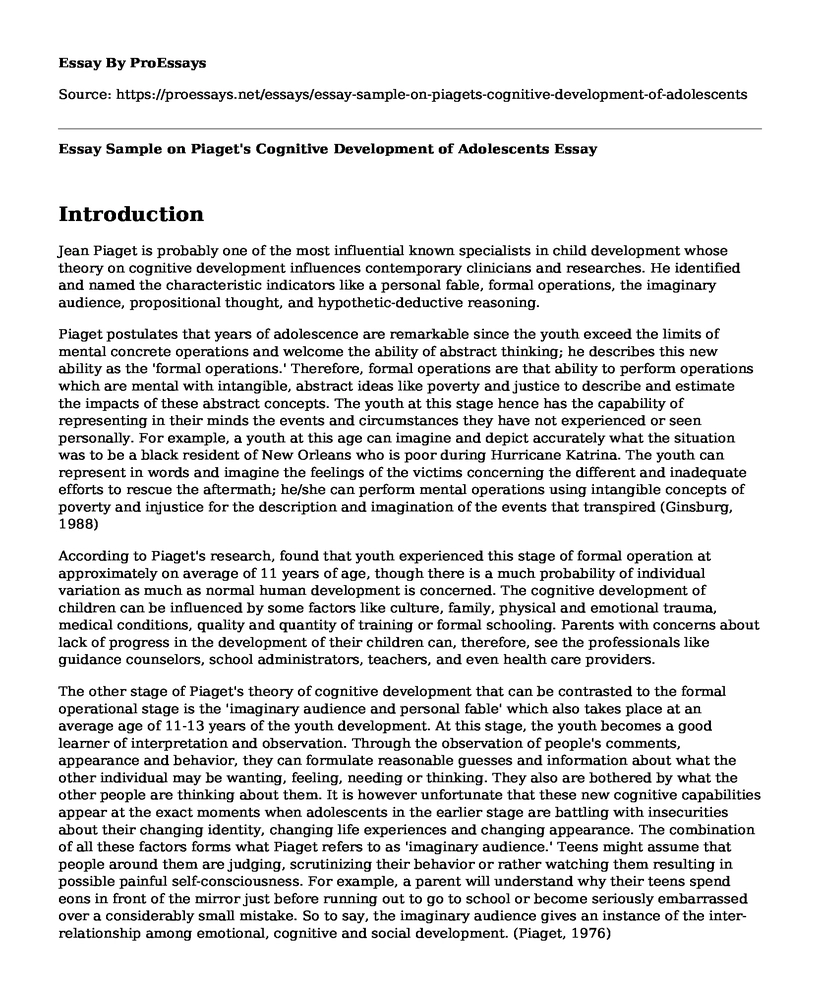Introduction
Jean Piaget is probably one of the most influential known specialists in child development whose theory on cognitive development influences contemporary clinicians and researches. He identified and named the characteristic indicators like a personal fable, formal operations, the imaginary audience, propositional thought, and hypothetic-deductive reasoning.
Piaget postulates that years of adolescence are remarkable since the youth exceed the limits of mental concrete operations and welcome the ability of abstract thinking; he describes this new ability as the 'formal operations.' Therefore, formal operations are that ability to perform operations which are mental with intangible, abstract ideas like poverty and justice to describe and estimate the impacts of these abstract concepts. The youth at this stage hence has the capability of representing in their minds the events and circumstances they have not experienced or seen personally. For example, a youth at this age can imagine and depict accurately what the situation was to be a black resident of New Orleans who is poor during Hurricane Katrina. The youth can represent in words and imagine the feelings of the victims concerning the different and inadequate efforts to rescue the aftermath; he/she can perform mental operations using intangible concepts of poverty and injustice for the description and imagination of the events that transpired (Ginsburg, 1988)
According to Piaget's research, found that youth experienced this stage of formal operation at approximately on average of 11 years of age, though there is a much probability of individual variation as much as normal human development is concerned. The cognitive development of children can be influenced by some factors like culture, family, physical and emotional trauma, medical conditions, quality and quantity of training or formal schooling. Parents with concerns about lack of progress in the development of their children can, therefore, see the professionals like guidance counselors, school administrators, teachers, and even health care providers.
The other stage of Piaget's theory of cognitive development that can be contrasted to the formal operational stage is the 'imaginary audience and personal fable' which also takes place at an average age of 11-13 years of the youth development. At this stage, the youth becomes a good learner of interpretation and observation. Through the observation of people's comments, appearance and behavior, they can formulate reasonable guesses and information about what the other individual may be wanting, feeling, needing or thinking. They also are bothered by what the other people are thinking about them. It is however unfortunate that these new cognitive capabilities appear at the exact moments when adolescents in the earlier stage are battling with insecurities about their changing identity, changing life experiences and changing appearance. The combination of all these factors forms what Piaget refers to as 'imaginary audience.' Teens might assume that people around them are judging, scrutinizing their behavior or rather watching them resulting in possible painful self-consciousness. For example, a parent will understand why their teens spend eons in front of the mirror just before running out to go to school or become seriously embarrassed over a considerably small mistake. So to say, the imaginary audience gives an instance of the inter-relationship among emotional, cognitive and social development. (Piaget, 1976)
This ability of keen observation and abstract thought enables youth to be more sensitive and more concerned with other's needs, but this can lead to some new emotional and social difficulties especially when these new cognitive behaviors are used for the comparison with others, this is what is referred to as 'personal fable', the belief of unique problems, unique abilities which are different from everyone.
The assumption that young people are 'lone scientists' who discover their world is essential for youth involved in a creative activity that is, the youth become more logical and scientific in the way they handle problems, well known as the scientific, methodical approach to solving the problem. The youth can consider a situation or a problem and identify the various variables that may affect or influence the outcome. They can deduce the most probable outcome if one of the variables is altered; this is an ability that finds application for the selection of the most sensible and logical solution.
References
Ginsburg, H. P., & Opper, S. (1988). Piaget's theory of intellectual development. Prentice-Hall, Inc.
Piaget, J. (1976). Piaget's theory. In Piaget and his school (pp. 11-23). Springer, Berlin, Heidelberg.
Cite this page
Essay Sample on Piaget's Cognitive Development of Adolescents. (2022, Nov 30). Retrieved from https://proessays.net/essays/essay-sample-on-piagets-cognitive-development-of-adolescents
If you are the original author of this essay and no longer wish to have it published on the ProEssays website, please click below to request its removal:
- Yoga and Meditation are the Best Stress Management Practices for First Responders
- Personal Statement on GPR Internship Program
- Supporting Essay for Lesson Plan
- Challenges That Early Childhood Educators Face Essay
- Term Paper on Teaching Reading: Cognitive Development & Comprehension
- The Impact of Physical Activities on My Childhood - Essay Sample
- Essay Example on Burnout in Medical Professionals: Causes and Solutions







